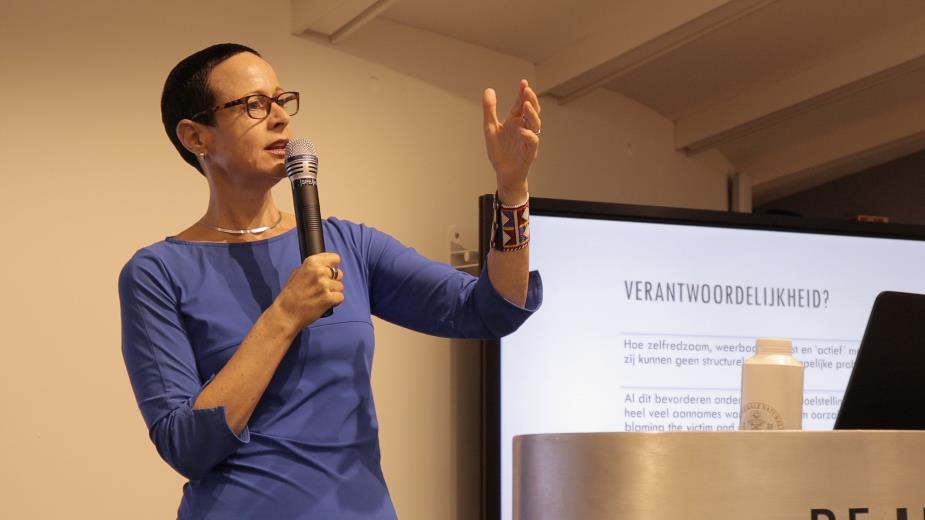New professor delivers inaugural lecture on ‘Inclusion is about power’
6 September 2022
Inclusive education is an important priority for THUAS. Since 1 January 2021, Naomi van Stapele has been the Inclusive Education professor at the Global & Inclusive Learning Centre of Expertise.

Inclusive education is an important priority for THUAS. Since 1 January 2021, Naomi van Stapele has been the Inclusive Education professor at the Global & Inclusive Learning Centre of Expertise. On 16 September, she will hold her inaugural lecture. ‘Inclusion is about countering power. And that requires radical critical thinking.’
‘You have to pay constant attention to what inclusion really means. Often, people have good intentions, but the core of the problem is not addressed. Inclusion is explicitly not about conforming to the majority, to the dominant system. Inclusion is precisely about countering any form of domination, and that starts with being open to the perspectives and backgrounds of others, without prejudice. This is of course especially important in higher education where we want to encourage critical thinking in our students.’
Language
According to Naomi, the conversation on inclusion already starts with language use. ‘We have to be very careful with our language.’ Before you know it, you are speaking the language of the established system and contributing to maintaining prejudice or reproducing disadvantaged positions. ‘Take the word “disabled”. Someone is not disabled. Society makes someone disabled by judging them normatively and disadvantaging them by not taking different forms of mobility into account, for example.’
Somalia
‘Our university of applied sciences is very diverse. Our students literally come from every corner of the world. As a lecturer, you have a pedagogical responsibility to learn, also from our students. Language is our tool. We have all kinds of assumptions in the way we teach that are influenced by the dominant standards in our society. Last year, I spoke to a Somali student who heard from her lecturer that Somalia was a failed state. This is Eurocentric framing. Many Somalis I know prefer to talk about a state that has been destroyed.’
New educational language
Naomi emphasises that THUAS has wonderful intentions for inclusive education. ‘But despite all the good work, we are not there yet, of course. Inclusive education requires constant work, from all of us. I understand, for example, that not everyone uses inclusive language in their teaching yet. In our project on inclusive language use, students and lecturers are working on a new educational language. This language has diversity as its starting point so that there is no longer a ‘normal’, and therefore also no ‘abnormal’ either.’
Skinclusive
Language is the basis for both the content and form of education. Naomi: ‘Take the Skin therapy degree programme for example. A number of students pointed out that the education was unilaterally focused too much on white skin. Now students and lecturers are working together in our Partner UP project to renew the degree programme's content to make sure there is a structural focus on all skin types and colours.’
Internship discrimination
The Inclusive Education research group is involved in 14 national and international research projects. The research group cooperates locally in the project ‘THUAS approach to internship discrimination’. We use action-oriented research to find specific solutions. ‘I have heard stories of lecturers advising their students of colour to not include a photo on their CV and to simplify their surname. That is shocking, of course.’
Hope is discipline
Despite the fact that, according to Naomi, dominant thinking still prevails in society, she is hopeful for an inclusive future. ‘I have been working in Kenya for 30 years and I have learnt from the young people there that hope is discipline. On the one hand, you now see a toughened stance in the public debate in the Netherlands; on the other hand, a lot is happening and it’s now important to connect all those actions for real change.’
Blind spot
The professor believes that transformation starts with yourself first. ‘It's a collective process that starts with asking yourself questions. How do I deal with other people? Where is my blind spot? Together we have to take a radically critical look inward. For example, when I stand in front of a group and I talk about ‘we', I ask if everyone feels included. This creates space for dialogue. And that is perhaps needed more now than ever before.’